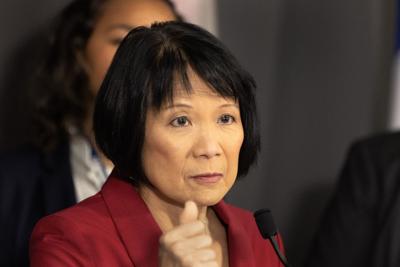Mayor Olivia Chow applauded people interested in joining Toronto’s new crisis response team, saying that as a teenager with a mentally ill and violent father she would have used the alternative to summoning police officers.
Chow made the comments at a job fair Wednesday to fill more than 100 positions with the pc28╣┘═°Community Crisis Service. Handling wellness checks and reports of people in the midst of a mental heath crisis, the team is expanding citywide.
The 66-year-old mayor recounted arriving from Hong Kong as a teenager and coping with the struggles of her late father whose unemployment was accompanied by mental breakdowns, thinking people were following and poisoning him, and his physical abuse of Chow’s mother.
“I didn’t want to call the police even though there was violence ÔÇŽ I didn’t know what to do,” Chow said, adding teenagers in a similar situation today can call 211 and trigger deployment of the crisis team which, as Toronto’s fourth emergency service, joins police, fire and paramedics.
“It gives people hope. It gives them a chance to heal. And healing can’t happen if they’re stuck in the criminal justice system, because that is not the right kind of support for them. We know that because we’ve seen some tragic results,” the mayor said, referring to people killed by police after relatives or friends called 911 seeking help for them.
Speaking later to reporters, Chow said: “I am incredibly encouraged to see people interested in this kind of work. It’s excellent, it works and we’re very proud of this service,” which received 7,000 calls last year, responding to those not involving┬áthe threat of violence to the workers.
Launched in 2022 as a pilot project in parts of Toronto, the crisis team “provides free, confidential, in-person mental health supports from mobile crisis worker teams to pc28╣┘═°residents 16 years of age or older 24 hours a day, seven days a week,” the city said, adding the service provides a “non-police-led model of mental health crisis response that is community-based, client-centred and trauma informed.”
Although it could take the rest of this year to hire and train all new team members needed to get the service fully functioning across the city, Chow urged Torontonians to call 211 if somebody is suffering mental health crisis. “Do not hesitate ÔÇö we’ll figure it out,” with help from community agencies, the mayor said. Such calls to 911 are also diverted to 211 if there is no imminent threat of violence.
The new staff will be hired by┬áand work through five community agencies including the Gerstein Crisis Centre, TAIBU Community Health Centre and the pc28╣┘═°branch of the Canadian Mental Health Association.
Chow said that, since health is a provincial and federal funding responsibility, she hopes the other governments will help the city cover the cost of the expanded service. The total approved budget for the crisis team this year is $26.8 million.
Resty Nasasira was among more than 120 people at the job fair in Metro Hall listening to a panel discussion about the team and its hiring needs, with offers of information about the application process.
The peer support worker said she was considering applying to join the crisis team and gain new skills that could eventually lead to a job at a drug rehabilitation centre.
“It’s good to help people, everyone wants the process of healing,” Nasasira said. “You have to first know what is their trauma, accept and not judge them, and use strategies to help them,” avoid crisis.
Correction — March 11, 2024
This story has been updated. A previous version incorrectly reported that the new crisis team workers would be hired by the city and work through five community agencies. In fact, the staff will be hired by the agencies funded by the city to provide the service.




























To join the conversation set a first and last name in your user profile.
Sign in or register for free to join the Conversation